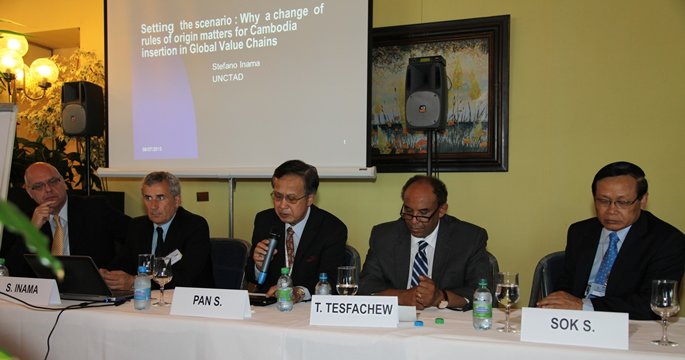Cambodia's expanding bicycle-manufacturing industry will face challenges if rules of origin for preferential tariffs are changed, experts have said.
Their comments came at a meeting entitled "Global value chains and rules of origin: Opportunities and challenges for Cambodia", which was held in Geneva on 8 July.
The main topic of the meeting was the pending changes regarding rules of origin for exports to the European Union (EU) and Canada. Existing preferential trade rules have allowed Cambodia to enter new value chains and to diversify its export strategy from garments to higher-skill export products, especially bicycles.
In 1968, UNCTAD recommended the creation of the Generalized System of Preferences (GSP), under which industrialized countries would grant autonomous trade preferences to all developing countries.
The European Union's GSP scheme helps developing countries by making it easier for them to export their products to the EU. This is done in the form of reduced tariffs for their goods when entering the EU market. Through the additional export revenue that is generated, the scheme helps foster growth and job creation in developing countries.
Success with bicycle manufacturing was now creating additional opportunities for economic progress in Cambodia, panellists said, since the volume of bicycle production was now large enough to interest bicycle parts manufacturers. They went on to say that there was now an opportunity to establish an integrated bicycle industry in Cambodia.
However, the European Union and Canada are in the process of "graduating" countries from their GSP list, which offers favourable trade terms.
Graduation may have negative implications for Cambodia, panellists said, since inputs from the graduated countries, such as parts, will not be eligible for what is called "cumulation," thus breaking the established value chain pattern.
Cumulation is a practice - under rules of origin - that permits the use of inputs from other regional partners so that the inputs can be considered as domestic inputs. If the parts from regional partners cannot be counted as Cambodian parts, bicycle manufacturers will not be able to comply with the rules of origin and will have to pay a 14 per cent duty, instead of benefiting from duty-free status as they do at present.
The panel, which consisted of government and private-sector representatives, explored the impact that GSP graduation would have on Cambodia's trade benefits as a least developed country. And it discussed the challenges that Cambodia faces in dealing with these changes.
Possible trade policy options were reviewed, and the consequences for the bicycle manufacturing sector were highlighted - particularly the potential losses in employment, and the loss of opportunities to develop local skills.
The panel meeting was the result of UNCTAD's implementation of a technical cooperation project funded by the European Union and the World Bank.
UNCTAD is currently assisting the Government of Cambodia in complying with rules of origin requirements, and in developing trade policy options to address the country's current trade challenges.

The panellists were:
- Pan Sorasak, Secretary of State of the Ministry of Commerce of Cambodia
- Taffere Tesfachew, Director of UNCTAD's Division for Africa, Least Developed Countries and Special Programmes
- Stefano Inama, Chief of UNCTAD's Unit on the Enhanced Integrated Framework
- Sok Sopheak, Director-General for International Trade, Ministry of Commerce of Cambodia
- Jon Edwards, Chief Executive Officer of Arthur and Judy (Taiwan Province of China, and Cambodia). The Cambodian subsidiary of the firm has been producing bicycles since 2006.
In 2012, it sold 465,616 bicycles.



